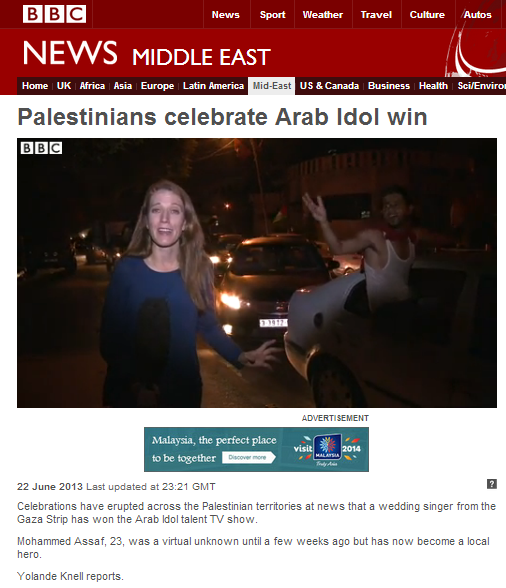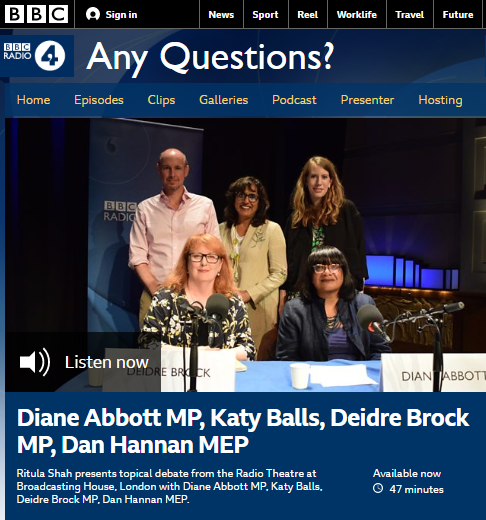For the second time in less than ten days, a June 22nd report by the BBC Jerusalem Bureau’s Yolande Knell featured an ‘Arab Idol’ reality show contestant from the Gaza Strip. The article, which appeared in the ‘Features & Analysis’ section of the BBC News website’s Middle East page at 08:04 GMT, includes a filmed item also broadcast on BBC television news as well as a written report.
As was the case in Knell’s previous piece featuring Mohammed Assaf which was broadcast on ‘From Our Own Correspondent’ on June 13th, her descriptions of “his patriotic songs full of love and longing” conveniently skirt round the fact that at least one of them erases Israel from the map.
“Oh flying bird, circling round,
My eyes protect you and Allah keeps you safe
By Allah, oh traveling [bird], I burn with envy
My country Palestine is beautiful
Turn to Safed and then to Tiberias,
And send regards to the sea of Acre and Haifa
Don’t forget Nazareth – the Arab fortress,
And tell Beit Shean about its people’s return
By Allah, oh traveling [bird], I burn with envy
My country Palestine is beautiful.”
Mohammed Assaf’s use of songs with political themes appears to be nothing new:
“Assaf first made his name inside the Gaza Strip in 2001, at the age of 11, when he recorded a song called “O Town Be Strong,” at the height of Israeli military activity in the Gaza Strip during the violent Second Intifada.”
Whilst Knell refrains from properly informing her audiences about the significance of Assaf’s political messaging and the part it plays in his popularity, other journalists are more frank.
“Assaf has chosen to perform a mix of classic songs by well-known Arab singers as well as songs about the Palestinian cause. One was a love song by the late Egyptian singer Abdel Halim Hafez, and another about a Palestinian refugee in Lebanon longing to return to his ancestral home in what is now Israel.
Assaf, too, has touched on the hardships endured by his people. Wearing the traditional Palestinian black-and-white headscarf around his neck during performances, he has spoken about the Israeli occupation and Palestinian prisoners held in Israeli jails.
He has expressed admiration for Samer Issawi, who became a symbol of the Palestinian struggle over his long-term hunger strike in an Israeli jail. In an interview with the unofficial Palestinian news agency Maan last month, Assaf said that “if I had to choose between winning the Arab Idol title and the freedom of Samer Issawi, I would choose freedom for the Palestinian hero whose steadfastness is peerless and I can’t compare myself to it”.”
The “hero” of the singer himself described by Knell as “a Palestinian hero” was of course convicted of acts of terrorism.
“[Issawi] was convicted of severe crimes, which including five attempts of intentional death. This included four shootings, between July 2001 and February 2002, in which Isawi and his partners fired on police cars and buses travelling between Ma’ale Adumim and Jerusalem. In one attack, a policeman was injured and required surgery. On October 30, 2001, Isawi, together with an accomplice, fired at two students walking from the Hebrew University campus to their car in a nearby parking lot. In another case, Isawi provided guns and explosive devices to a squad, who fired on a bus. Finally, in December 2001, Isawi ordered an attack on security personnel at Hebrew University, providing a squad with a pistol and a pipebomb. Two of the squad members tracked security personnel but opted not to execute the attack.”
Knell’s reports are dominated by a ‘Cinderella’ theme which serves once again to entrench stereotypical notions of life in the Gaza Strip as frequently promoted by the BBC. In the filmed item she makes much of Assaf’s “humble beginnings” in “Gaza’s Khan Yunis refugee camp” where “poverty and unemployment are high”, stating that:
“The neighbourhood’s often been at the centre of fighting in conflicts with Israel.”
In the written piece, Knell adds a statement which is euphemistic in its first half and context-free in its second:
“The camp has produced many young militants and has been targeted by Israeli air strikes.”
That passive, anodyne description fails to make sufficiently clear that Khan Yunis has been the launching site for thousands of missile attacks on Israeli civilians since Israel’s disengagement from the Gaza Strip and before that was frequently the source of attacks on the residents of Gush Katif, including the murder of Tali Hatuel and her four daughters.
A relative interviewed by Knell in the television report states:
“Mohammed – like all of the Palestinians – like all of the refugees who suffer from the obstacles and restrictions from the Israel [sic] and the situation.”
But according to numerous other reports, including one from Maan, Mohammed Assaf was actually born in Libya.
“Assaf, born in Misrata in Libya in 1990, started singing aged five after returning to Gaza when his father finished his accountancy work in the North African country.”
Whether or not the Assaf family was among the 30,000 Palestinians expelled by Gaddafi from Libya in the mid-nineties due to his opposition to the Oslo Accords is unclear, but certainly the family’s arrival in Khan Yunis does not appear to have any connection to Israel.
Knell even drags Israel into her tale of how Assaf almost did not make it to the auditions for the show – despite the fact that he exited the Gaza Strip via a border over which Israel has no control whatsoever.
“Border restrictions, which were tightened by Israel and Egypt after the Islamist group, Hamas, took over the Gaza Strip, make it difficult to travel, for young men in particular.
The story goes that the singer got stuck at Egypt’s Rafah border crossing and arrived late at the recital hall to find admissions had finished. But a call to his mother inspired him to jump over the wall.”
Later on the same day, after Mohammed Assaf had been pronounced winner of the reality show, Knell produced two further reports on the subject – one written – complete with ‘analysis’ – and one filmed.
All of Knell’s total of five reports on this subject over the last ten days have promoted two main themes: that of Assaf’s perceived positive influence on ‘Palestinian unity’ (which the BBC long since adopted as a worthy cause) and the Cinderella story of a poor Palestinian emerging triumphant against the odds – with those odds being mainly composed of factors for which Israel can be blamed. Mohammed Assaf’s use of songs promoting a political ideology opposed to Israel’s existence and his reverence of a convicted terrorist do not fit into Knell’s idealised narrative and so BBC audiences receive no objective analysis of the significance of those factors as contributors to his popularity and success.







